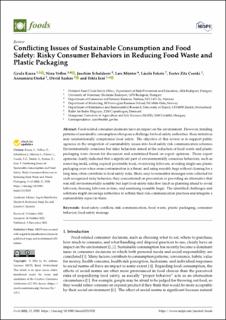Conflicting Issues of Sustainable Consumption and Food Safety: Risky Consumer Behaviors in Reducing Food Waste and Plastic Packaging
| dc.contributor.author | Kasza, Gyula | |
| dc.contributor.author | Veflen, Nina | |
| dc.contributor.author | Scholderer, Joachim | |
| dc.contributor.author | Münter, Lars | |
| dc.contributor.author | Fekete, László | |
| dc.contributor.author | Csenki, Eszter Zita | |
| dc.contributor.author | Dorkó, Annamária | |
| dc.contributor.author | Szakos, Dávid | |
| dc.contributor.author | Izsó, Tekla | |
| dc.date.accessioned | 2022-12-21T11:41:36Z | |
| dc.date.available | 2022-12-21T11:41:36Z | |
| dc.date.created | 2022-12-02T09:03:34Z | |
| dc.date.issued | 2022 | |
| dc.identifier.citation | Foods. 2022, 11 (21), . | |
| dc.identifier.issn | 2304-8158 | |
| dc.identifier.uri | https://hdl.handle.net/11250/3039015 | |
| dc.description.abstract | Food-related consumer decisions have an impact on the environment. However, trending patterns of sustainable consumption often pose a challenge for food-safety authorities: these initiatives may unintentionally compromise food safety. The objective of this review is to support public agencies in the integration of sustainability issues into food-safety risk communication schemes. Environmentally conscious but risky behaviors aimed at the reduction of food waste and plastic packaging were chosen for discussion and scrutinized based on expert opinions. Those expert opinions clearly indicated that a significant part of environmentally conscious behaviors, such as removing mold, eating expired perishable food, overstoring leftovers, avoiding single-use plastic packaging even when cross-contamination is a threat, and using reusable bags without cleaning for a long time, often contribute to food-safety risks. Short, easy-to-remember messages were collected for each recognized risky behavior; they concentrated on prevention or providing an alternative that was still environmentally sensible but kept food-safety risks low (such as planning ahead to avoid leftovers, freezing leftovers in time, and sanitizing reusable bags). The identified challenges and solutions might encourage authorities to rethink their risk-communication practices and integrate a sustainability aspect in them. | |
| dc.language.iso | eng | |
| dc.title | Conflicting Issues of Sustainable Consumption and Food Safety: Risky Consumer Behaviors in Reducing Food Waste and Plastic Packaging | |
| dc.title.alternative | Conflicting Issues of Sustainable Consumption and Food Safety: Risky Consumer Behaviors in Reducing Food Waste and Plastic Packaging | |
| dc.type | Peer reviewed | |
| dc.type | Journal article | |
| dc.description.version | publishedVersion | |
| dc.source.pagenumber | 0 | |
| dc.source.volume | 11 | |
| dc.source.journal | Foods | |
| dc.source.issue | 21 | |
| dc.identifier.doi | 10.3390/foods11213520 | |
| dc.identifier.cristin | 2087534 | |
| cristin.ispublished | true | |
| cristin.fulltext | original | |
| cristin.qualitycode | 1 |
Tilhørende fil(er)
Denne innførselen finnes i følgende samling(er)
-
Artikler / Articles [1456]
-
Publikasjoner fra CRIStin [2533]
